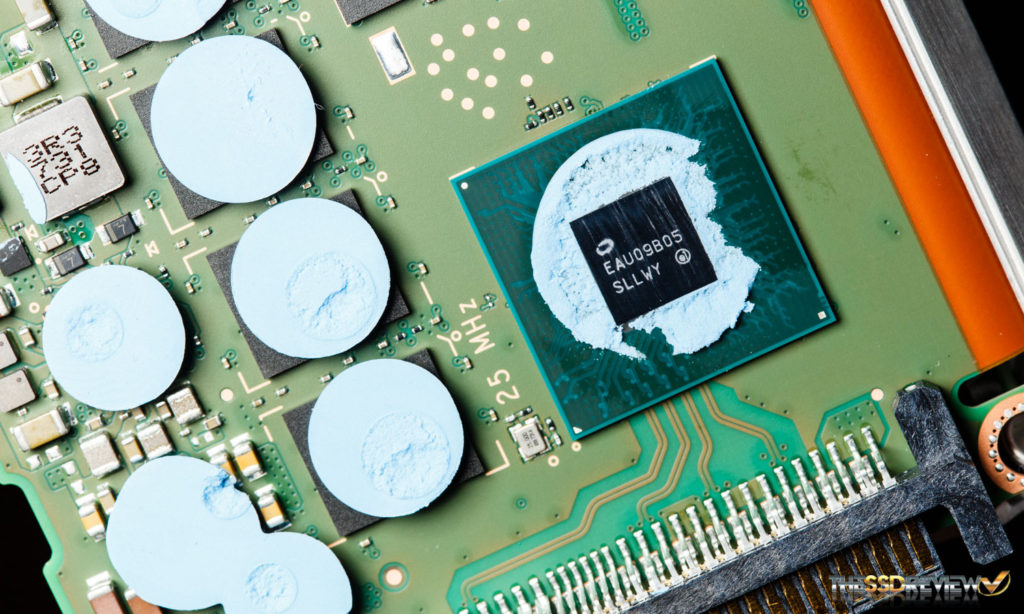REPORT ANALYSIS AND FINAL THOUGHTS
The Intel DC P4510 was built for the cloud with many things in mind, but the two most important aspects were capacity and performance. With a new 4TB and 8TB models coming this quarter, the DC P4510 has capacity covered. Now, let’s talk performance. The DC P4510 is able to deliver leaps and bounds better performance than the DC P4500. This is not only due to improvements in their firmware management but heavily due to the 64-layer 3D TLC NAND flash program latency being half that of the previous gen 32-layer stuff…and this can easily be seen by the difference in the SNIA latency results from the DC P3520 vs our much lower average and max latency from the DC P4510.
In our testing today, the Intel DC P 4510 delivered the performance Intel said it would and that performance is quite impressive. During sequential tests the DC P4510 delivered 3.2GB/s read, 3GB/s write and, during 4K random testing, it was able to deliver 639K IOPS read and 139.5K IOPS write. Low QD performance was a strong suit for our 2TB and 8TB samples. In almost every test we threw at them they lead the pack from QD1-32 and even up to QD64 in some. During our server workload profiles, the 8TB model wound up caught in the middle of the pack in QDs 128-256. Once we got to check out the power efficiency, it was clear as day that the Intel DC P4510 is one of the most efficient enterprise NVMe SSDs on the market. Through testing, it trades blows with the Intel DC P3700, which set the standard for efficiency in most of our tests.
FINAL THOUGHTS
Intel is working hard on the storage ecosystem to push scalability with their products. With the release of Optane devices and these newer 3D NAND devices, such as the DC P4510 we tested today, they are looking to optimize rack space and deliver more performance through storage. By replacing the traditional compute and storage mix with a more scalable architecture, Intel is able to deliver the value of pairing. Servers can deliver up to 4x the capacity just by swapping out DC P3520s with these 8TB DC P4510s alone. Mix it in with an Optane cache and it is a recipe for high-capacity and some very low latency.
The Intel DC P4510 delivers value through efficiency. It allows data centers to do more per server than with previous products. A lot of work went into addressing issues with management at scale and tweaking the firmware to deliver end users a better quality of service. Our tests today proved the later, and while we didn’t dive into manageability in our review, after speaking with Intel representatives about the product more, it became very apparent that they have you covered when it comes to the management. These relatively small U.2 form factor drives are packed with some killer NAND and throw quite the punch when pushed. If you’re considering the Intel DC P4510 series for your next deployment, you won’t be disappointed. These are some very high-performance high-capacity drives that have earned our Gold Seal of approval!
Check out the Intel DC P4510 and other Intel SSDs on Amazon today!
 The SSD Review The Worlds Dedicated SSD Education and Review Resource |
The SSD Review The Worlds Dedicated SSD Education and Review Resource | 


Do you have access to, and are willing to review, the Intel SSD DC P4511 Series in 2TB and 4TB capacity?
I’m especially interested in their 4K Q1D1 random speeds.
No sorry. I don’t believe they have sampled that drive.
OK, thanks for letting me know.
Forgot to add the link to the Intel website : https://www.intel.com/content/www/us/en/products/compare-products.html/memory-storage?productIds=192995,137107,137112
are these drives good to use on a Mac?
Yes, these drives are compatible with any PC or Mac, however as they use the U.2 interface you will need an adapter like a U.2 to PCIE adapter, and it can connect fine to a Mac Pro tower.